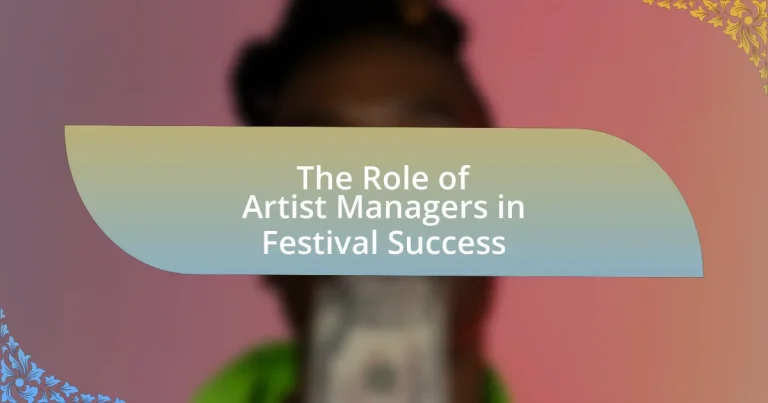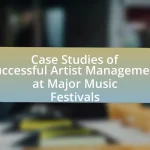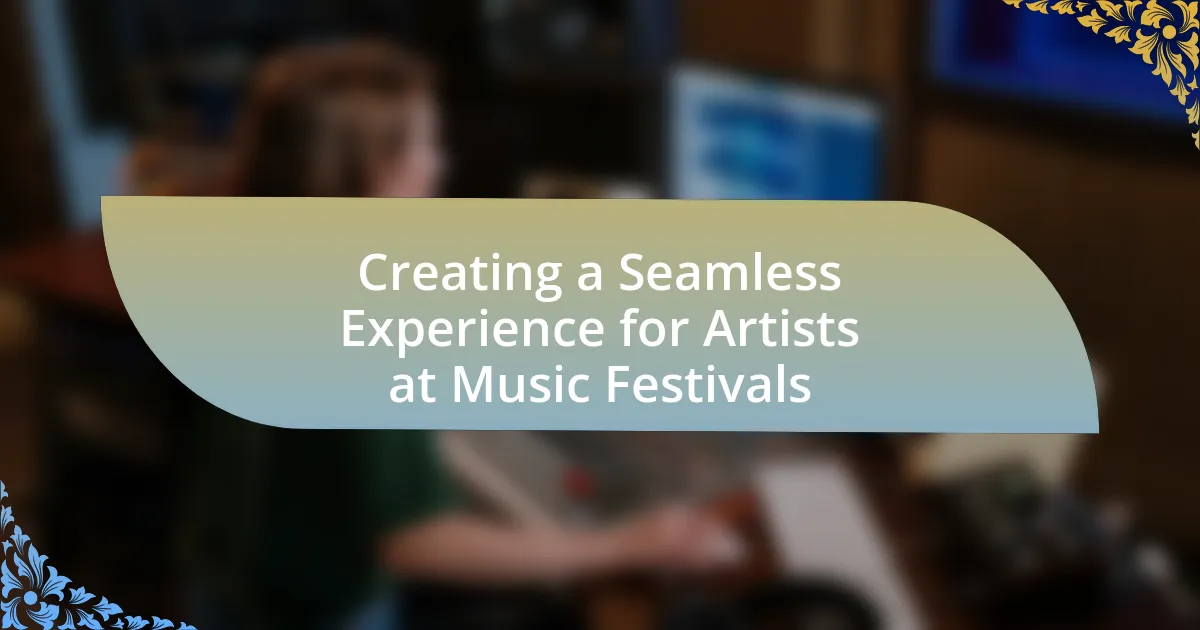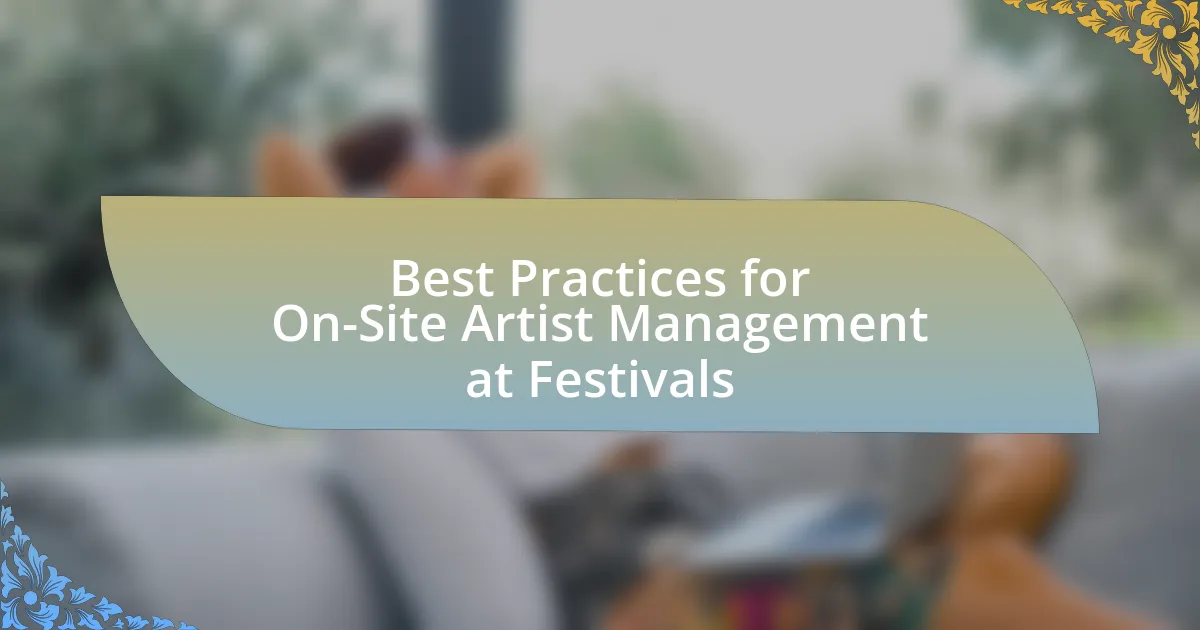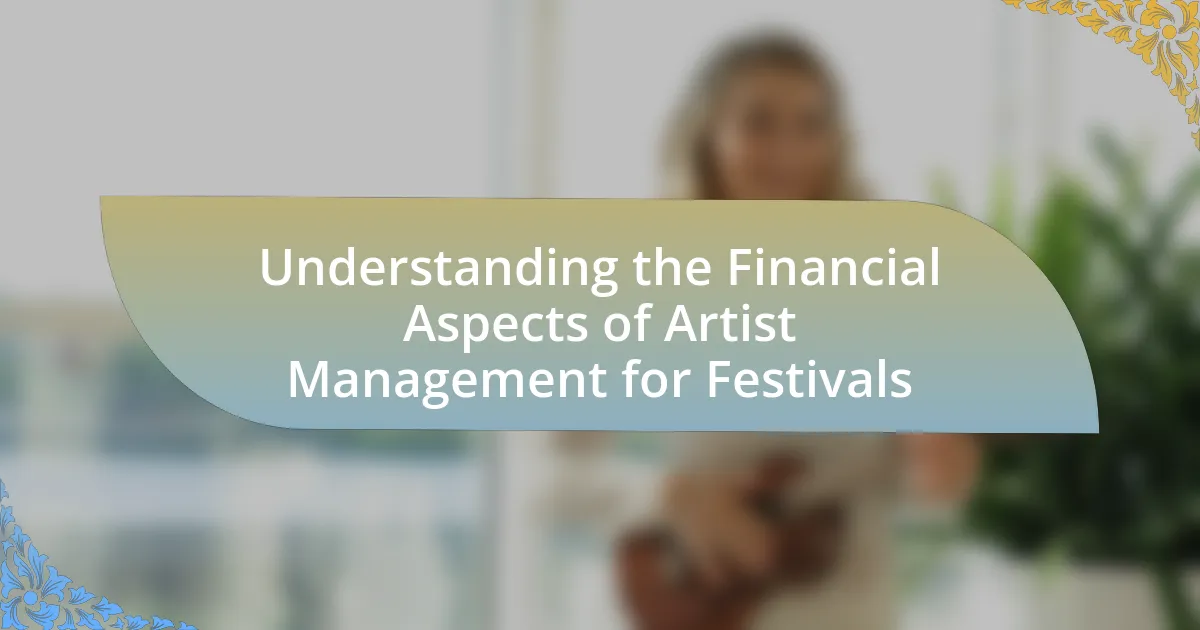Artist managers are essential to the success of music festivals, as they coordinate logistics, promote artists, and facilitate communication among all involved parties. Their responsibilities include scheduling performances, negotiating contracts, and managing artists’ needs, which directly influence the festival’s execution and overall success. By enhancing artist visibility and audience engagement, artist managers contribute to increased ticket sales and a positive festival experience. Additionally, they navigate challenges such as logistical complexities and financial constraints, employing strategies to maximize artist exposure and ensure smooth operations during events. This article explores the multifaceted role of artist managers in festival success, detailing their contributions, responsibilities, and the skills necessary for effective management.
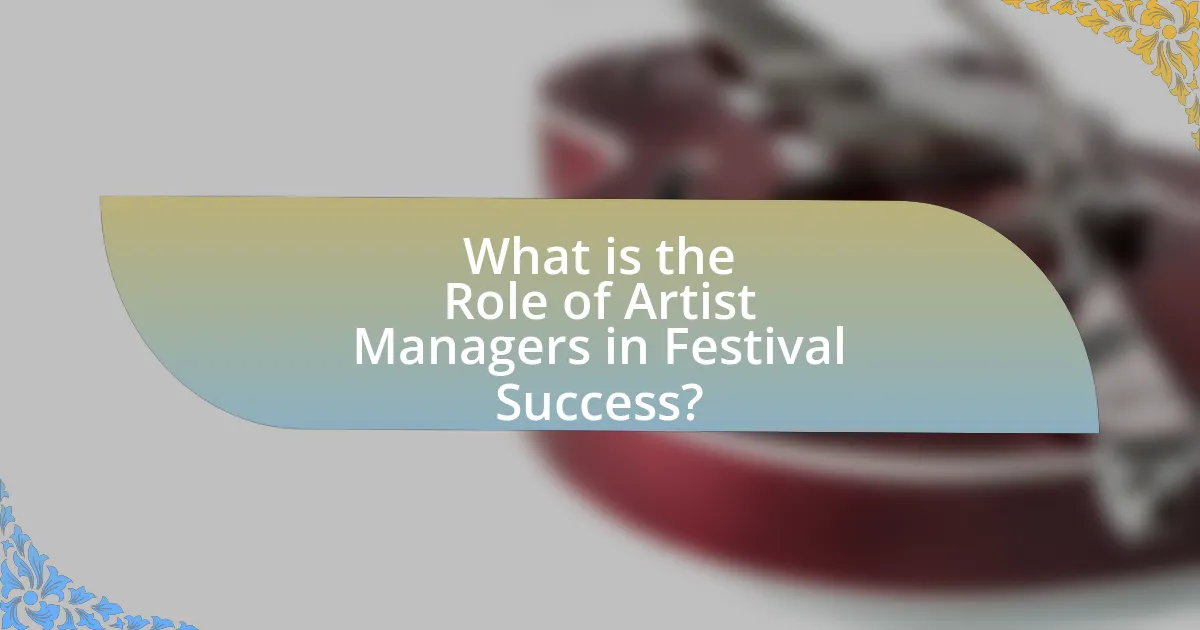
What is the Role of Artist Managers in Festival Success?
Artist managers play a crucial role in the success of music festivals by coordinating logistics, promoting artists, and ensuring effective communication between all parties involved. They handle scheduling, negotiate contracts, and manage the artists’ performance requirements, which directly impacts the festival’s overall execution. For instance, a well-organized artist manager can enhance an artist’s visibility and audience engagement, leading to higher ticket sales and a more successful event. Additionally, artist managers often facilitate relationships with festival organizers, helping to align the artists’ goals with the festival’s objectives, ultimately contributing to a seamless experience for both performers and attendees.
How do artist managers contribute to the overall success of a festival?
Artist managers significantly contribute to the overall success of a festival by ensuring that their artists are well-prepared, promoted, and supported throughout the event. They handle logistics such as scheduling performances, negotiating contracts, and coordinating travel arrangements, which allows artists to focus on their performances. Additionally, artist managers often engage in marketing efforts, leveraging their networks to enhance the festival’s visibility and attract larger audiences. For instance, a well-managed artist can draw in fans, increasing ticket sales and overall attendance, which is crucial for a festival’s financial success. Their expertise in artist development and audience engagement directly impacts the festival’s reputation and longevity in the competitive entertainment landscape.
What specific responsibilities do artist managers have during festivals?
Artist managers are responsible for coordinating logistics, ensuring the artist’s needs are met, and managing communication during festivals. They handle scheduling, oversee sound checks, and liaise with festival organizers to ensure the artist’s performance runs smoothly. Additionally, artist managers monitor the artist’s well-being, manage any issues that arise, and ensure compliance with contractual obligations. These responsibilities are crucial for maintaining the artist’s focus and performance quality, ultimately contributing to the festival’s success.
How do artist managers coordinate with festival organizers?
Artist managers coordinate with festival organizers by establishing clear communication and logistical planning. They negotiate performance details, including set times, technical requirements, and artist accommodations, ensuring that both the artist’s needs and the festival’s capabilities align. This coordination often involves regular meetings and updates to address any changes or challenges that may arise, thereby facilitating a smooth collaboration. For instance, successful festivals like Coachella and Glastonbury rely on effective artist management to streamline operations, demonstrating the critical role of these managers in enhancing festival success.
Why is the role of artist managers crucial for artists at festivals?
The role of artist managers is crucial for artists at festivals because they handle logistics, negotiations, and promotion, ensuring that artists can focus on their performance. Artist managers coordinate schedules, manage contracts, and facilitate communication between the artist and festival organizers, which is essential for a smooth festival experience. For instance, according to a study by the Music Industry Research Association, effective management can increase an artist’s visibility and opportunities at festivals, leading to higher audience engagement and potential revenue. This support allows artists to maximize their performance impact and career growth during festival events.
What advantages do artists gain from having a manager at festivals?
Artists gain several advantages from having a manager at festivals, including enhanced logistical support, negotiation power, and increased visibility. A manager coordinates schedules, handles contracts, and ensures that the artist’s needs are met, allowing the artist to focus on their performance. Additionally, managers leverage their industry connections to negotiate better performance fees and secure prime slots, which can significantly impact an artist’s exposure and career trajectory. For instance, a well-connected manager can facilitate introductions to key industry players, leading to potential collaborations and future opportunities.
How do artist managers help in maximizing an artist’s exposure at festivals?
Artist managers maximize an artist’s exposure at festivals by strategically securing performance slots, negotiating favorable terms, and promoting the artist’s brand. They leverage industry connections to book artists on high-profile stages, ensuring visibility among key audiences and industry professionals. Additionally, managers coordinate promotional activities, such as social media campaigns and press outreach, to enhance the artist’s presence before and during the festival. This multifaceted approach not only increases attendance at the artist’s performances but also fosters networking opportunities that can lead to future collaborations and bookings.
What challenges do artist managers face in ensuring festival success?
Artist managers face several challenges in ensuring festival success, including coordinating logistics, managing artist expectations, and navigating financial constraints. Coordinating logistics involves scheduling performances, arranging transportation, and ensuring technical requirements are met, which can be complex given the number of artists and varying needs. Managing artist expectations is crucial, as artists may have specific demands or visions for their performances that must align with festival goals. Financial constraints also pose a significant challenge, as managers must work within budgets while securing fair compensation for artists and ensuring profitability for the festival. These challenges require effective communication, negotiation skills, and strategic planning to achieve a successful outcome.
How do artist managers handle conflicts or issues during festivals?
Artist managers handle conflicts or issues during festivals by employing effective communication and negotiation strategies. They act as intermediaries between artists and festival organizers, ensuring that any disputes are addressed promptly and professionally. For instance, if an artist faces scheduling conflicts or technical issues, the manager will coordinate with festival staff to find solutions, such as adjusting performance times or resolving equipment malfunctions. This proactive approach minimizes disruptions and maintains the artist’s reputation, which is crucial for long-term success in the industry.
What strategies do artist managers use to overcome logistical challenges?
Artist managers utilize several strategies to overcome logistical challenges, including meticulous planning, effective communication, and leveraging technology. Meticulous planning involves creating detailed schedules and contingency plans to address potential issues before they arise. Effective communication ensures that all stakeholders, including artists, venues, and vendors, are aligned and informed, reducing the likelihood of misunderstandings. Leveraging technology, such as project management software and communication tools, streamlines coordination and enhances real-time problem-solving. These strategies are essential for ensuring smooth operations during festivals, as evidenced by successful events that rely on well-organized management to handle complex logistics efficiently.
How do artist managers influence the selection of festivals for their artists?
Artist managers influence the selection of festivals for their artists by leveraging their industry connections and expertise to secure performance opportunities that align with the artist’s brand and audience. They assess festival lineups, negotiate contracts, and advocate for their artists’ interests, ensuring that the chosen festivals enhance the artist’s visibility and career trajectory. For instance, a manager may prioritize festivals that attract the artist’s target demographic, thereby maximizing exposure and potential revenue. Additionally, managers often have established relationships with festival organizers, which can facilitate invitations and favorable performance slots, further demonstrating their critical role in the festival selection process.
What skills are essential for artist managers to succeed in festival environments?
Essential skills for artist managers to succeed in festival environments include strong communication, organizational abilities, negotiation skills, and crisis management. Effective communication ensures clear interactions with artists, festival organizers, and vendors, facilitating smooth operations. Organizational abilities are crucial for managing schedules, logistics, and multiple artists simultaneously, as festivals often involve complex timelines. Negotiation skills help secure favorable terms for artists, including performance fees and accommodations, which can significantly impact their success at the event. Lastly, crisis management skills are vital for addressing unexpected issues, such as technical difficulties or scheduling conflicts, ensuring that the artist’s performance remains unaffected. These skills collectively enhance the artist’s experience and contribute to the overall success of the festival.
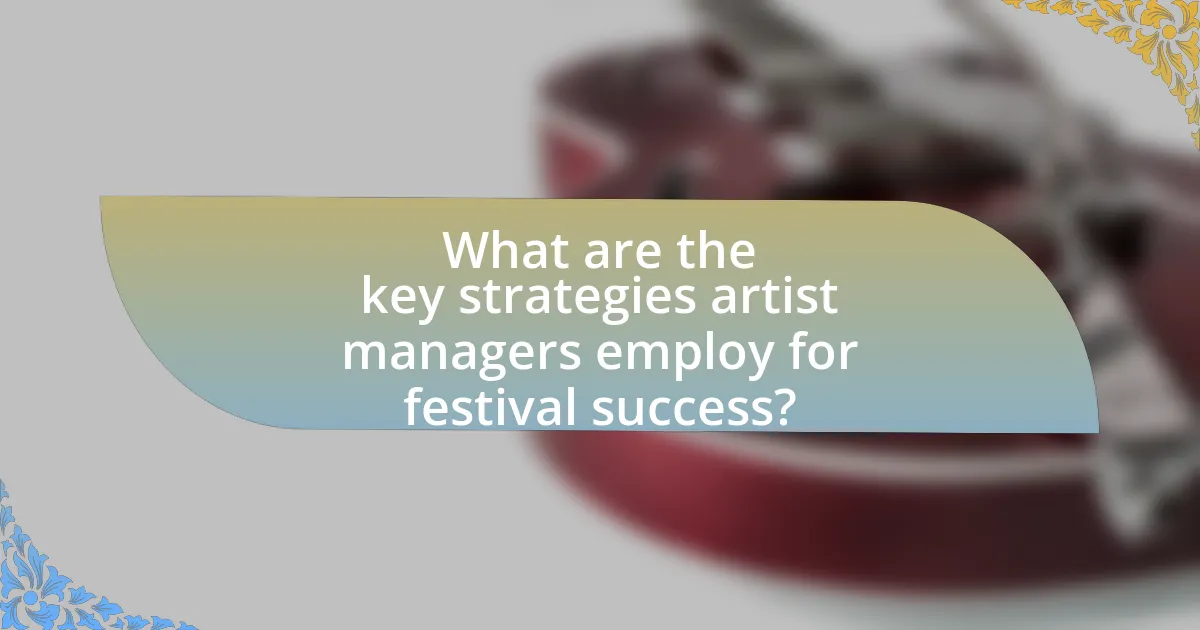
What are the key strategies artist managers employ for festival success?
Artist managers employ several key strategies for festival success, including effective communication, strategic booking, and audience engagement. Effective communication ensures that all parties, including artists, promoters, and festival organizers, are aligned on expectations and logistics, which is crucial for smooth operations. Strategic booking involves selecting the right festivals that align with the artist’s brand and target audience, maximizing exposure and potential revenue. Audience engagement strategies, such as social media promotion and interactive experiences, help to build a loyal fan base and enhance the overall festival experience. These strategies are supported by industry data indicating that well-managed artists often see higher attendance and engagement at festivals, leading to increased opportunities for future performances.
How do artist managers plan and prepare for festivals?
Artist managers plan and prepare for festivals by coordinating logistics, scheduling performances, and ensuring the artist’s needs are met. They begin by securing performance slots and negotiating contracts with festival organizers, which includes discussing fees, accommodations, and technical requirements. Additionally, artist managers create detailed itineraries that outline travel arrangements, rehearsal times, and set times, ensuring that all aspects of the festival experience are organized. They also communicate with the artist to align on setlists and promotional activities, which is crucial for maximizing the artist’s visibility and engagement at the festival. This structured approach is essential for optimizing the artist’s performance and overall success at the event.
What role does budgeting play in an artist manager’s festival strategy?
Budgeting is crucial in an artist manager’s festival strategy as it directly influences the financial viability and overall success of the event. Effective budgeting allows the manager to allocate resources for essential expenses such as artist fees, travel, accommodations, and marketing, ensuring that all logistical aspects are covered. For instance, a well-planned budget can help avoid overspending, which is critical given that festivals often operate on tight margins; according to a report by the Eventbrite team, 70% of festival organizers cite budgeting as a primary challenge. By maintaining a clear budget, artist managers can also negotiate better deals and maximize the return on investment, ultimately enhancing the artist’s exposure and profitability at the festival.
How do artist managers select the right festivals for their artists?
Artist managers select the right festivals for their artists by evaluating factors such as the artist’s genre, audience demographics, and the festival’s reputation. They analyze the alignment between the artist’s brand and the festival’s image to ensure a good fit, which can enhance exposure and career growth. For instance, a manager might choose a well-established festival known for a specific genre that matches the artist’s style, thereby increasing the likelihood of attracting the right audience. Additionally, they consider logistical aspects like location, timing, and potential for networking opportunities, which can further benefit the artist’s career trajectory.
What networking opportunities do artist managers leverage at festivals?
Artist managers leverage various networking opportunities at festivals, including connecting with industry professionals, engaging with other artists, and establishing relationships with promoters and agents. These interactions facilitate collaborations, enhance visibility for their artists, and open doors for future bookings. Festivals serve as a concentrated environment where multiple stakeholders in the music industry gather, allowing artist managers to build a network that can lead to strategic partnerships and career advancements for the artists they represent.
How do artist managers build relationships with other industry professionals at festivals?
Artist managers build relationships with other industry professionals at festivals through networking, collaboration, and strategic communication. They actively engage with promoters, agents, and other managers during events, facilitating introductions and fostering connections. By attending industry panels, workshops, and social gatherings at festivals, artist managers can share insights and establish rapport with key figures in the music industry. This proactive approach is supported by the fact that successful networking can lead to future opportunities, as evidenced by numerous case studies showing that artists with strong management often secure better festival slots and collaborations.
What impact does networking have on an artist’s career during festivals?
Networking significantly enhances an artist’s career during festivals by creating opportunities for collaboration, exposure, and industry connections. Festivals serve as a hub where artists can meet industry professionals, including managers, agents, and other artists, facilitating relationships that can lead to future gigs, partnerships, and promotional opportunities. For instance, a study by the Music Industry Research Association found that 70% of artists reported securing new bookings through connections made at festivals, highlighting the tangible benefits of networking in this environment.
How do artist managers assess the success of their artists at festivals?
Artist managers assess the success of their artists at festivals primarily through metrics such as audience engagement, ticket sales, and social media interactions. They analyze the size of the crowd during performances, noting factors like audience response and participation, which indicate the artist’s popularity and connection with fans. Additionally, managers track merchandise sales and streaming numbers post-festival to gauge the impact of the event on the artist’s overall marketability. For instance, a significant increase in social media followers or engagement rates following a festival performance can serve as a concrete indicator of success.
What metrics do artist managers use to evaluate performance at festivals?
Artist managers use several key metrics to evaluate performance at festivals, including audience engagement, merchandise sales, social media interactions, and overall attendance. Audience engagement can be measured through crowd size and audience reactions during the performance, indicating the artist’s ability to connect with fans. Merchandise sales provide a direct financial metric reflecting the artist’s popularity and marketability. Social media interactions, such as likes, shares, and comments, offer insights into the artist’s reach and fan engagement post-performance. Overall attendance at the festival can also serve as a benchmark for the artist’s draw and popularity within the festival lineup. These metrics collectively help artist managers assess the success of their artists at festivals and inform future booking decisions.
How do artist managers gather feedback post-festival to improve future performances?
Artist managers gather feedback post-festival through surveys, direct interviews, and social media analysis to enhance future performances. Surveys are distributed to attendees, artists, and crew members to collect quantitative and qualitative data on various aspects of the festival experience. Direct interviews with performers and staff provide deeper insights into specific areas for improvement. Additionally, analyzing social media comments and engagement metrics helps managers understand audience sentiment and preferences. This multi-faceted approach ensures that artist managers can make informed decisions based on comprehensive feedback, ultimately leading to improved performances in subsequent festivals.
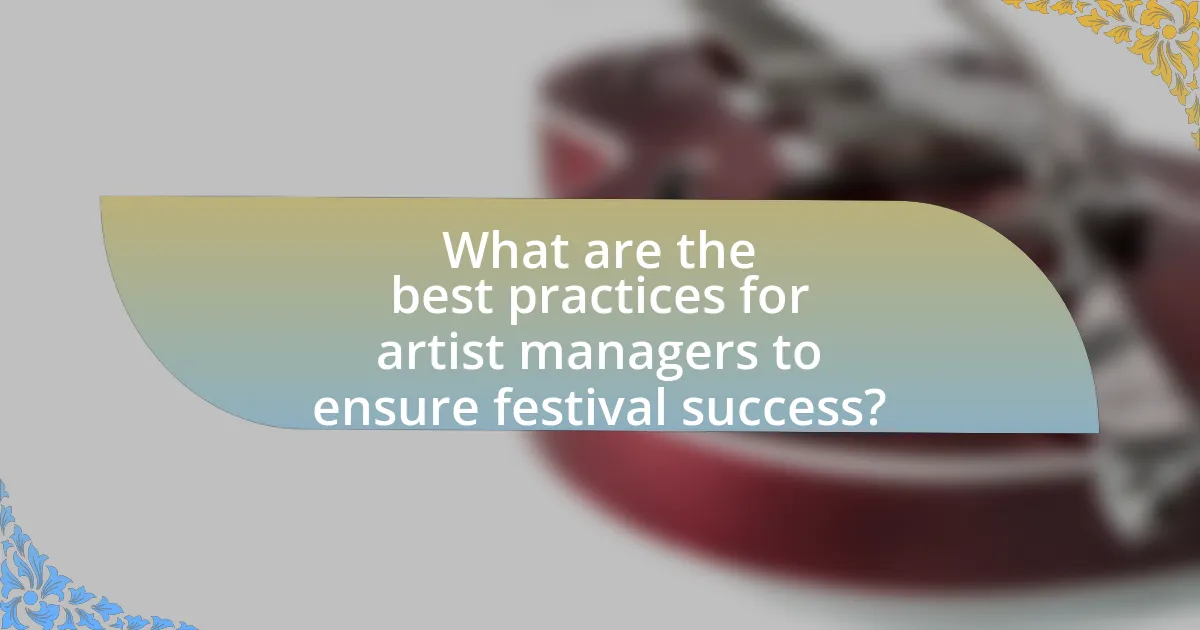
What are the best practices for artist managers to ensure festival success?
Artist managers can ensure festival success by implementing effective communication, thorough planning, and strategic networking. Effective communication involves maintaining clear and consistent dialogue with festival organizers, artists, and other stakeholders to align expectations and responsibilities. Thorough planning includes detailed logistics management, such as scheduling rehearsals, coordinating travel arrangements, and ensuring that all technical requirements are met. Strategic networking allows artist managers to build relationships with key industry players, which can lead to better opportunities and support during the festival. These practices are validated by industry standards, which emphasize the importance of collaboration and preparation in achieving successful festival outcomes.
How can artist managers effectively communicate with festival organizers?
Artist managers can effectively communicate with festival organizers by establishing clear, consistent, and professional channels of communication. This involves using direct methods such as emails, phone calls, and meetings to discuss logistics, artist requirements, and festival expectations. For instance, a study by the International Music Managers Forum highlights that timely and transparent communication fosters better relationships and ensures that both parties are aligned on performance details, schedules, and technical needs. By maintaining open lines of dialogue and being responsive to inquiries, artist managers can enhance collaboration and contribute to the overall success of the festival.
What are the key elements of successful communication between managers and organizers?
Successful communication between managers and organizers hinges on clarity, active listening, and mutual respect. Clarity ensures that both parties understand expectations and objectives, which is crucial for effective collaboration. Active listening fosters an environment where feedback is valued, allowing for adjustments and improvements in planning and execution. Mutual respect builds trust, enabling open dialogue and problem-solving. Research indicates that effective communication can enhance team performance by up to 25%, highlighting its importance in achieving festival success.
How can artist managers ensure their artists’ needs are met during festivals?
Artist managers can ensure their artists’ needs are met during festivals by proactively communicating with festival organizers and establishing clear expectations. This involves detailed planning, including confirming technical requirements, hospitality needs, and performance schedules well in advance. For instance, managers should verify sound checks, stage setups, and accommodations to align with the artist’s preferences and requirements. Additionally, maintaining open lines of communication during the festival allows for immediate resolution of any issues that may arise, ensuring that the artist’s experience is smooth and focused on their performance. This approach is supported by industry standards, which emphasize the importance of thorough preparation and real-time problem-solving in event management.
What tips can artist managers follow to enhance their artists’ festival experiences?
Artist managers can enhance their artists’ festival experiences by ensuring thorough preparation and effective communication. This includes coordinating logistics such as travel, accommodations, and performance schedules to minimize stress and maximize focus. Additionally, managers should establish clear lines of communication with festival organizers to address any potential issues proactively.
Research indicates that well-prepared artists perform better and have more positive experiences at festivals, leading to increased audience engagement and satisfaction. For instance, a study by the University of Southern California found that artists who received comprehensive support from their management reported higher levels of performance quality and audience interaction.
How can artist managers prepare their artists mentally and physically for festivals?
Artist managers can prepare their artists mentally and physically for festivals by implementing structured routines, providing emotional support, and ensuring proper physical conditioning. Establishing a pre-festival schedule that includes rehearsals, relaxation techniques, and nutrition plans helps artists acclimate to the festival environment. Emotional support can be offered through regular check-ins and stress management strategies, such as mindfulness practices or access to mental health resources. Additionally, physical conditioning through exercise and rest ensures that artists maintain their stamina and health, which is crucial for high-energy performances. These methods are supported by research indicating that mental preparation and physical fitness significantly enhance performance outcomes in high-pressure environments like festivals.
What common pitfalls should artist managers avoid during festival planning?
Artist managers should avoid poor communication during festival planning, as it can lead to misunderstandings and logistical issues. Effective communication ensures that all parties, including artists, promoters, and vendors, are aligned on expectations and responsibilities. Additionally, neglecting to establish a clear budget can result in overspending or inadequate resources, which can jeopardize the festival’s success. Failing to conduct thorough research on the festival’s audience and market can also lead to misaligned artist bookings, diminishing the event’s appeal. Lastly, overlooking the importance of contingency planning can leave managers unprepared for unexpected challenges, such as weather disruptions or technical failures, which can significantly impact the festival experience.
